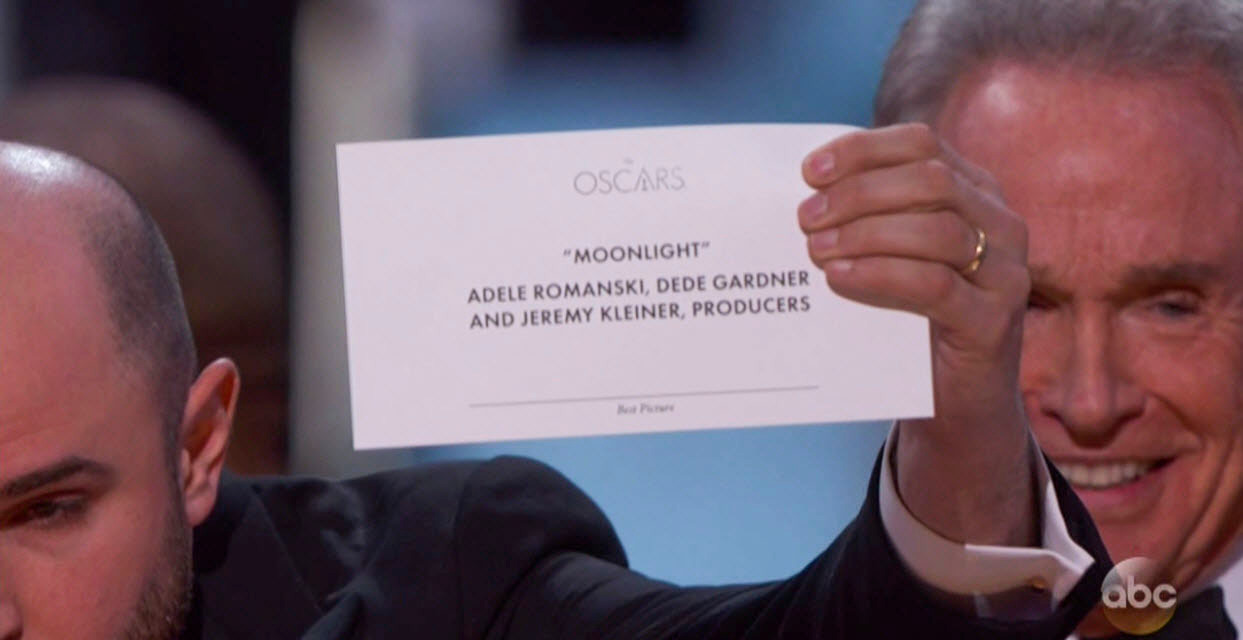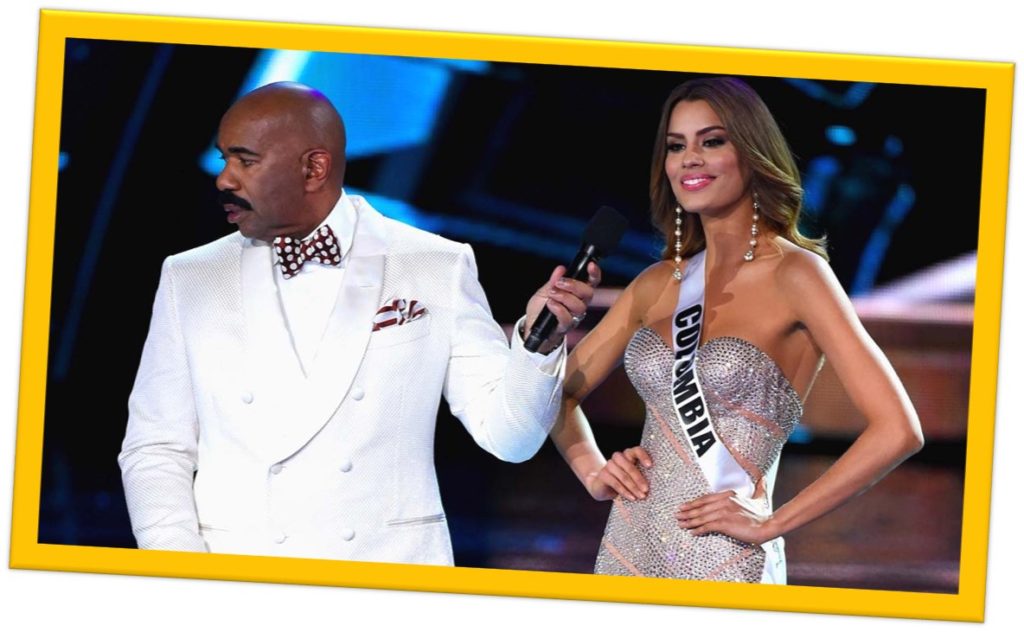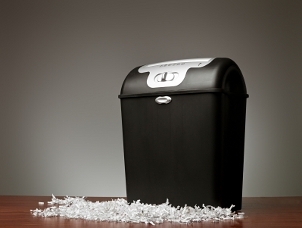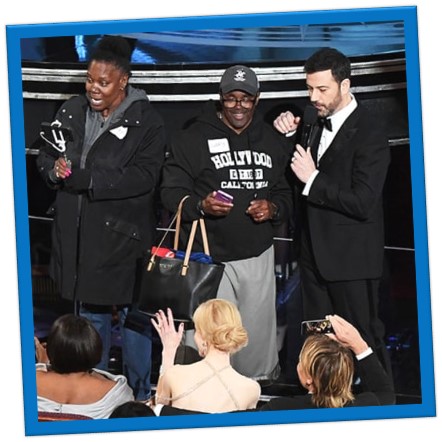pre
In less than 15 months, two major awards shows have been severely botched on live TV – Miss Universe in late 2015 and the Academy Awards show this past Sunday. In both cases, the grievous error was committed at the epitome of the evening – the crowning of the pageant winner and the Oscar for Best Picture respectively.
Coincidence?
I think not.
(And there were also disc jockeys in the middle of both of these fiascos – Steve Harvey and (former radio DJ) Jimmy Kimmel. Back to them in a moment.)
On the Academy Awards show, the investigation continues around the painful snafu seen around the world. Most agree the error occurred because accounting firm PricewaterhouseCoopers produces two identical sets of winners’ envelopes. The envelopes are on opposite ends of the stage, so it doesn’t matter which side presenters enter from. But their two accountants – known as the “balloting leaders” – flubbed their management of the important red envelopes.
When Emma Stone received her Oscar, a duplicate envelope For “Best Actress” still existed on the opposite side of the stage And that’s the one Warren Beatty was handed when he walked out on stage that produced the moment of Oscar infamy.
Amazingly, PwC has handled the balloting, the envelopes, and their security for more than 80 years. And yet, when it came down to the actual execution of handing the right envelope to the right presenter for the right award at the right time, the system broke down.
Blaming the accountants or Warren Beatty is misplaced and unfair. In Beatty’s case, he’s talent. While an esteemed director and producer, in the role of Oscar presenter, he did what he was told. He was handed an envelope. He wasn’t sure what was happening when he saw Emma Stone’s name on the card. He handed it to his partner, Faye Dunaway, and the rest is infamous history.
But the coordination of the Oscars (or Miss Universe) goes beyond counting the votes. And the lack of prep and smart systems explains why the most famous awards  program in the world suffered an epic fail.
program in the world suffered an epic fail.
So, you have to wonder who’s calling the shots on this show. Who decides how PwC handles its envelopes and its stage procedures? And why would anything so critically important be left to chance – to bean counters or actors and actresses who are experiencing a tense and exciting moment?
The Academy Awards show doesn’t need an investigation. It needs a great Program Director.
Pros like Kevin Weatherly, Dave Richards, or Jim Ryan wouldn’t have let this happen. The best radio PDs sweat every little detail, especially when it’s about high-visibility, pressurized events where there are numerous people in the mix, especially talent. You don’t leave the outcome up to the real-time reactions of actors and DJs. You have to anticipate everything.
Great programmers always approach these mega-moments where there’s a lot at stake by asking themselves the age-old question:
What could possibly go wrong and what can I do to prevent it from happening?
In the case of the Academy Awards screw-up, several events might have contributed to the mayhem:
- The envelopes were a different color this year – red with gold lettering. That might have made the labeling less legible.
- One of the ballot leaders took a selfie with Emma Stone before the grievous error occurred. Soon after, he handed Warren Beatty the wrong envelope.
- Having duplicate envelopes on each side of the stage is an invitation for trouble.
Errors in awards show happen more than most of us think, A recent CNN Entertainment story catalogues other missteps, including Steve Harvey’s flub at the Miss Universe pageant. But on Sunday, the screw-up happened at the apex of the evening, where there was reputation, emotion, and deep feelings on the line – especially among those nominated for Best Picture.
The envelope issue is the lynchpin of this year’s Oscars story. And a savvy PD would have sniffed out that problem early on. Many have been through those tricky contests where there 101 keys but only one starts the car. When you’ve lived through enough of those high-pressure moments, you get good at fail-safing any event. Programmers always ask the question;
What could possibly go wrong and what can I do to prevent it from happening?
As someone who has spent more than a little think time trying to debug promotions and events that might go south, the answer to this Academy Award mess isn’t brain surgery. Perhaps it’s as simple as having Amazon deliver two paper shredders, one for each side of the stage. As the presenter is handed the correct envelope on stage left, the “ballot leader” on stage right shreds  the duplicate envelope. Done.
the duplicate envelope. Done.
As mentioned at the beginning of this post, it is also more than a little ironic that radio people were central in both the Miss Universe and Academy Award debacles – and it’s sad because neither was at fault.
In Steve Harvey’s case, he has described his moment as “Four minutes of hell.” His teleprompter was unclear, and he had a producer in his ear telling him what to do.
While Kimmel had nothing to do with any of this Oscar confusion, his first great line was “Personally, I blame Steve Harvey for this.”
And moment later, like the DJ at heart he will always be, he added in classic self-deprecating fashion:
“Well, I don’t know what happened. I blame myself…It’s just an awards show…I knew I would screw this show up. I really did…I promise I’ll never come back.”
Perfect.
But there’s another reason why the Academy Awards show needs a smart radio program director.
The ratings for the Oscar show were abysmal – the second least-watched Oscars since the low point in 2008. ABC averaged just under 33 million viewers, with a 13% drop in their target 18-49 demographic. This year’s show proved once again that despite the glitz, the stars, the fashions, and the pageantry, the show is a snooze.
 A radio PD would know just what to do – shorten the show, play the hits (more popular “popcorn movies”), fewer technical awards, and better use the Internet for the more obscure moments and tributes. Of course, contesting and “occasion-setting” would no doubt be part of the Oscars strategy as well.
A radio PD would know just what to do – shorten the show, play the hits (more popular “popcorn movies”), fewer technical awards, and better use the Internet for the more obscure moments and tributes. Of course, contesting and “occasion-setting” would no doubt be part of the Oscars strategy as well.
Kimmel’s inspired and now-controversial bit – dragging a Hollywood tour busload full of “regular folks” into the Dolby Theater was a madcap display of morning radio-style lunacy – perhaps the only moment of the night when viewers weren’t quite sure what might happen next. The Oscars could use more of these surprising and unpredictable interludes.
After this year’s disaster, the Oscars would do well to hire an experienced events programmer (or “showrunner”) tasked with making sure nothing like this happens again. And when they do, chances are good, the newly appointed Oscars PD will ask this time-honored question again and again:
What could possibly go wrong and what can I do to prevent it from happening?
As ABC’s Academy Awards show proved Sunday night, a great programmer is worth their weight in gold. A gold statue, that is.
- What Is It With Female Robot DJs? - April 30, 2025
- Why “Dance With Those Who Brung You” Should Be Radio’s Operating Philosophy In 2025 - April 29, 2025
- The Exponential Value of Nurturing Radio Superfans - April 28, 2025




Great article…thank you for this.
Maybe attendance was down too by the fact half of America is turned off by Hollywood and their political agenda.
I believe it’s a great lesson to entertainers (actors, musicians…) to leave politics out of it.
Could be. You’d think there would be a curiosity factor, but apparently not. Thanks for commenting.
This won’t go away for awhile, but the answers are pretty obvious, Fred. There were a few rules laid down before the show, including “no social media” for the envelope managers. Simply-2 people whose job was to hand out the proper envelope. One was distracted because he was tweeting and handing out envelopes at the same time. He should be fired immediately. I don’t care if he OWNS PWC. All presenters should have been told what to do if they had issues. This wasn’t a blockbuster movie, it was a TV show with a sole purpose. Honor the people who put these movies together. If Warren had said “I don’t get it”-and someone ran out to him right away-this wouldn’t have happened. It was more embarrassing for Kimmel to have to comment. Twice. He did what he had to do…but if someone had their act together-like the envelope dude-he wouldn’t have had to. For the show, it’s turned into a “you like me you really do” fest. They forget that there are millions watching around the world. The show should be for the VIEWERS if they really care about ratings. They’ve done these shows long enough to realize that people tune in for few reasons, none of them to see winners (some known-and some unknown) ramble on with their thanks to people no one knows. (Should a jock thank their chief engineer every day for keeping the station on the air?) They wanna see what the stars are wearing. They want to experience the “in memoriam” segment. Someone should sit down and go through the categories-see what the AUDIENCE is going to be interested in. Show us examples, and then present the awards. Forget the “thank you” speech. Much like you’ll never get a distracted envelope manager to hand out the right envelope every time, you won’t get industry people to stick to a 30 second time limit. Joe and Jenny viewer don’t care. If the award is for “BEST SONG” — let’s hear the song. If it’s for special effects, let’s see some of them. If it’s “Picture of the Year” – show me why. That’s what I (as a viewer) want to know. Radio people learned early on that inside comments (“hey that cart machine isn’t working is it?”) don’t cut it with the listener.
Well, there we go, Dave. It doesn’t take smart programming people long to figure out how to make this a better event (show). Thanks for putting your PD brain to work for this comment.
A couple of thoughts on what I just read. Get rid of the acceptance speech? Sometimes those are the best part of the show. Maybe just cut down on the awards that are given on camera, I guess. Most of the nerds that REALLY make the movies what they are probably can be handled in a small get together during the Oscar week that isn’t a TV show. In regard to the political comments. I don’t like to hear it if I don’t agree with it….LOL. I think I speak for many in that observation so just let it happen and accept you live in a free speech country. If you are really vexed then don’t buy a ticket to that particular actors next movie if that would make you feel better.
I (mostly) agree about the acceptance speech. Politics aside (I know – impossible, right?), some interesting and surprising things come out amidst the “thank you’s” that are often revealing about an actor. Thanks, Dan.
It’s an award show. It’s no big deal. And PDs make mistakes too… mainly because they’re human beings. In the industry we get into the nasty delusional habit thinking we could do it better. We are the best on-air personalities (behind the wheel of our car). We are the best programmers (when we are consulting but it’s not our butts on the line)- and we think our small industry and our analogies can solve it all. This mistake (because we’re not robots) made the show memorable and it was entertaining.. and that’s what the average consumer wants. Carry on.
Stan, we’re not on the same page on this one. It does matter – whether it’s a radio station or an awards show. Why shouldn’t it work well? And when you think about the trauma – ask Steve Harvey, Brian Cullinan and Marth Ruiz (who list their Oscar gigs), and of coure, the producers and crew on “La La Land” – if it can be prevented, why shouldn’t it be? Radio may pale in comparison to the movie industry, but I’d bet most of the radio PDs I work with would have figured this thing out before it become a disaster. Maybe mistakes and disasters make good TV, but for those of us who appreciate a show that is well-programmed and executed, it was a train wreck. Thanks for writing in.
I can appreciate your passion and desire for near perfection. Thank you, Fred.
Stan, I realize that some people read this post and thought I was being hyper-critical of the Academy Awards show and arrogant to think a radio programmer could “fix it.” But as a long-standing member of the radio PD community, most of us share that penchant to get it right, to figure it out, and to overcome the inevitable problems that crop up in a production with a lot of moving parts. Thanks for seeing in my way. 🙂